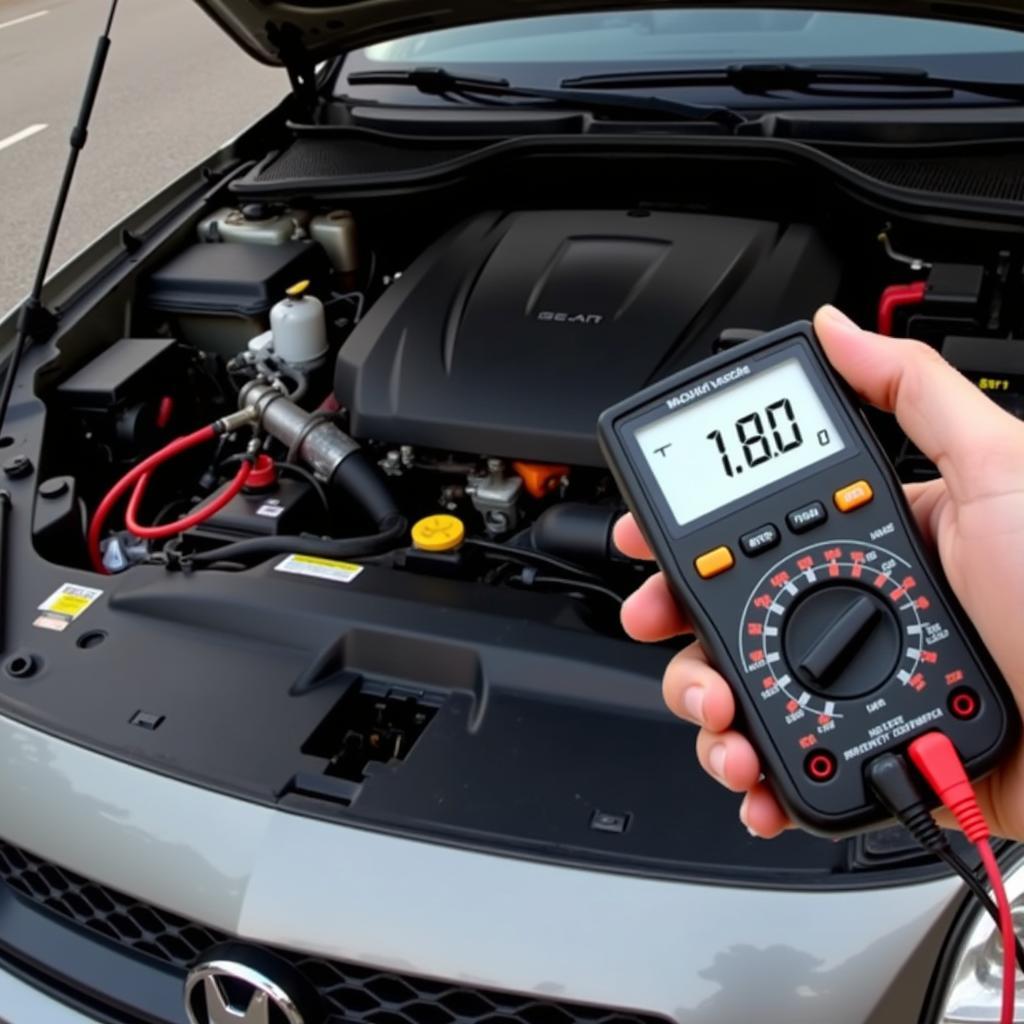A car battery is the heart of your vehicle’s electrical system. Understanding normal car battery voltage is crucial for maintaining your car’s health and avoiding unexpected breakdowns. Knowing what to look for can save you time, money, and frustration down the road.
A fully charged car battery typically rests at 12.6 volts or higher. When the engine is running, this voltage should increase to between 13.7 and 14.7 volts. This higher voltage indicates that the alternator is properly charging the battery. Anything significantly lower or higher than these ranges suggests a potential problem that needs attention.  Checking Car Battery Voltage with a Multimeter
Checking Car Battery Voltage with a Multimeter
What is Normal Car Battery Voltage When the Car is Off?
When your car is off, a healthy battery should read between 12.4 and 12.7 volts. This voltage represents the battery’s resting state, indicating a full charge. If you see a reading below 12.4 volts, your battery might be partially discharged and could struggle to start the vehicle, especially in cold weather. A voltage significantly below 12 volts likely indicates a deeply discharged or even a failing battery. If your car battery died, you’ll likely need a jump start or a new battery.
How to Test Your Car Battery Voltage
Testing your car battery voltage is a simple process using a multimeter. First, turn off your car’s ignition and all accessories. Then, connect the red (positive) lead of the multimeter to the positive terminal of your battery and the black (negative) lead to the negative terminal. The reading on the multimeter will indicate your battery’s voltage. Always exercise caution when working around a car battery, as they contain sulfuric acid, which can be dangerous.
Normal Car Battery Voltage When Car is Running
With the engine running, a normal car battery voltage should be between 13.7 and 14.7 volts. The alternator, responsible for charging the battery while the engine is running, should maintain this voltage range. A voltage lower than 13.7 volts might suggest a problem with the alternator, such as worn brushes or a failing voltage regulator. Conversely, a voltage higher than 14.7 volts could indicate an overcharging alternator, which can damage the battery and other electrical components. You can check for more details at normal battery voltage when car is running.  Testing Car Battery Voltage with Engine Running
Testing Car Battery Voltage with Engine Running
Signs of a Failing Battery
Beyond low voltage readings, several other signs can point towards a failing battery. These include slow engine cranking, dimming headlights, flickering interior lights, and clicking sounds when turning the key. If you experience any of these symptoms, it’s crucial to have your battery checked and potentially replaced.
What Affects Car Battery Voltage?
Several factors can influence car battery voltage. Temperature plays a significant role, as cold weather can reduce a battery’s capacity. The age of the battery is also important; older batteries tend to lose their ability to hold a charge. Excessive use of accessories like headlights, air conditioning, and the radio can also drain the battery, leading to lower voltage. If you’re interested in adding accessories like a train horn for car, ensure your battery and alternator can handle the increased electrical load.
John Smith, a seasoned automotive technician with over 20 years of experience, states, “Regularly checking your battery voltage is a simple preventative measure that can save you from unexpected breakdowns. A few minutes with a multimeter can provide valuable insights into your car’s electrical health.”
Jane Doe, an electrical engineer specializing in automotive systems, adds, “Understanding the relationship between the battery, alternator, and voltage is key to diagnosing and addressing electrical issues effectively.”  Factors Affecting Car Battery Voltage
Factors Affecting Car Battery Voltage
Conclusion
Maintaining a normal car battery voltage is crucial for ensuring the reliable operation of your vehicle. Regular checks with a multimeter, along with awareness of the signs of a failing battery, can help you avoid inconvenient breakdowns and costly repairs. By understanding what normal car battery voltage should be, you can take proactive steps to keep your car running smoothly. If you’re looking for a reliable car charger for your new phone, check out our recommendations for the iPhone 15 car charger.
FAQ
-
What is the normal car battery voltage when the car is off?
A healthy battery should read between 12.4 and 12.7 volts when the car is off. -
What is the normal car battery voltage when the car is running?
With the engine running, a normal battery voltage should be between 13.7 and 14.7 volts. -
How do I test my car battery voltage?
Use a multimeter to test the voltage by connecting the leads to the battery terminals. -
What are some signs of a failing car battery?
Signs include slow engine cranking, dimming headlights, and clicking sounds when starting. -
What factors affect car battery voltage?
Temperature, battery age, and accessory usage can all affect battery voltage. -
What should I do if my car battery voltage is low?
Have your battery and alternator checked by a professional. -
Can a bad alternator cause low battery voltage?
Yes, a faulty alternator can prevent the battery from charging properly, leading to low voltage.
More Helpful Resources
Explore more helpful articles on DiagXcar:
- How to Troubleshoot Cara Mias: cara mias
When you need assistance, please contact us via WhatsApp: +1(641)206-8880, Email: [email protected] or visit us at 276 Reock St, City of Orange, NJ 07050, United States. Our customer support team is available 24/7.


